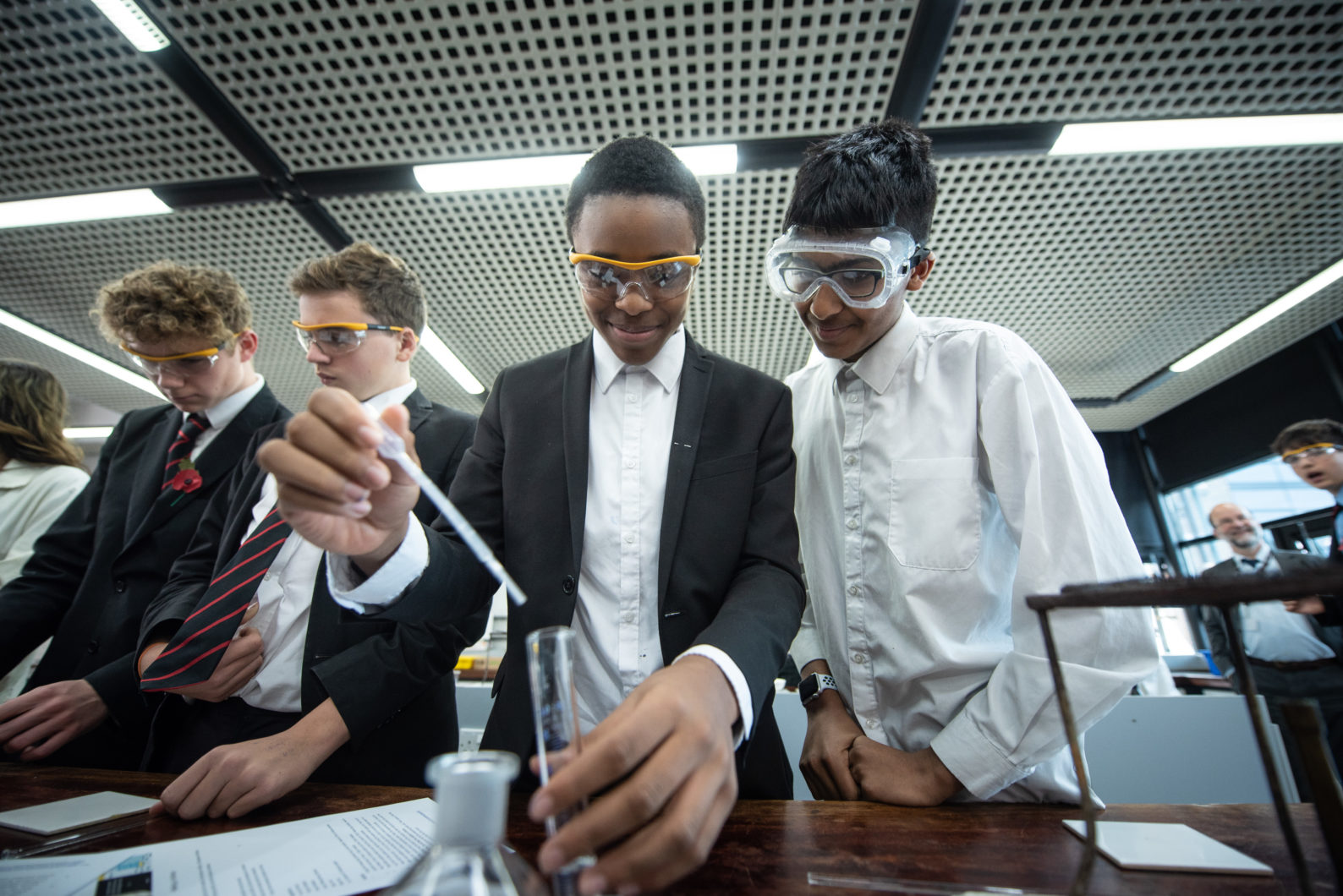Chemistry
Departmental philosophy
At its heart, Chemistry shows how every process and reaction in the universe is governed by a simple set of rules. Throughout their time at school, students go on a journey of discovery: from their first introduction to the elements, the building blocks of all matter, to multi-step organic syntheses. At each step, the foundations of the subject are built and then revisited, as more complex models allow a deeper understanding of each topic. Students learn how simple classroom experiments show the mechanism by which reactions take place; how the structure and shape of a water molecule leads to the patterns of ice on a frosty morning or how the colour of a copper sulfate solution is explained by the electronic structure of the copper ion.
Many chemical elements are named after countries but Argentina is the only country to be named after an element: silver.

Experienced and passionate teachers, with a background of academic excellence, staff the Chemistry Department at Magdalen College School. We each believe that learning the subject is about much more than just preparation for exams and, instead, aim to foster interest in science, more broadly. Students leave the school not just with top class grades but also an appreciation and understanding of how Chemistry has helped shape the modern world, for good and bad. They learn the social and environmental impacts of the march of technology, as well as how modern science is at the forefront of solving the challenges that face their generation.
Chemistry is an exciting, dynamic field that influences every facet of life. A strong grounding in the subject gives students a deeper understanding of everything from test tube reactions to changes on a planet-wide scale.
One bucket full of water contains more atoms than there are bucket fulls of water in the Atlantic Ocean.
The Sixth Form
Students who have chosen to take Chemistry into the Sixth Form are challenged to think for themselves, to unpick simple models and open their eyes to the world of chemistry beyond the A level course. Each class is taught by two teachers, with the course broadly split into Physical and Organic chemistry modules. The students study the OCR A specification and this is enhanced as they are encouraged to explore ideas such as molecular orbitals and a range of organic mechanisms. As their practical skills develop, students are introduced to more complex techniques and apparatus. They undertake a number of organic preparations using Quickfit glassware, and learn purification techniques. Analytical chemistry is learned through titrations and kinetics experiments.
If you slowly pour a handful of salt into a completely full glass of water, it will not overflow. In fact, the water level will go down.
Extra-Curricular Chemistry
Outside the normal curriculum, there are a number of ways that students can explore the subject in more depth and stretch their understanding. Aside from a large collection of books that can be borrowed, and a recommended list of both texts and popular science, students are encouraged to take part in the Royal Society of Chemistry Olympiad and the Cambridge Chemistry Challenge. We have had considerable success in these competitions but the benefit comes not from the certificates but from confronting new chemistry. The discovery that there is a whole world of science beyond the realms of the school curriculum is a powerful. The skills and lessons learned from the papers not only enhance students’ resilience but also teach logical problem solving.
The Waynflete program, and the interns that assist in the department, ensure that students learn to research ideas and are exposed to recent scientific publications. The interns also assist with clinics and problem sessions designed to support and stretch the students.
Lower sixth form students visit a local drug design and development company where they get a sense of chemistry in industry. The strong links to the university also provide a wealth of interesting speakers in a range of scientific fields.
Where Chemistry could take you
Chemistry at A Level provides the foundation not just for the further study of the subject itself but also a huge breadth of other disciplines. The combination of conceptual ideas and logical thinking lends itself to everything from pure science to Economics, Engineering to Law. Students leave Magdalen to read degrees at top class universities across the country and beyond. In recent years, this has included a significant number who have been accepted to study Natural Sciences at Cambridge; pure sciences at Oxford; and Medicine at a range of universities. The students are given advice and support when making these choices, with expertise in the department across a range of fields and a dedicated program for the Medical applicants. It is a testament to the enjoyment and hard work of the students that so many leave to study Chemistry and related subjects.
 MCS ranks among the top independent secondary schools, and in 2024 was awarded Independent School of the Year for our contribution to social mobility.
MCS ranks among the top independent secondary schools, and in 2024 was awarded Independent School of the Year for our contribution to social mobility.

 28 of our pupils achieved 10 or more 8 or 9 grades in 2024.
28 of our pupils achieved 10 or more 8 or 9 grades in 2024.
 In 2023-24, MCS received over £448,000 in donated funds.
In 2023-24, MCS received over £448,000 in donated funds.

